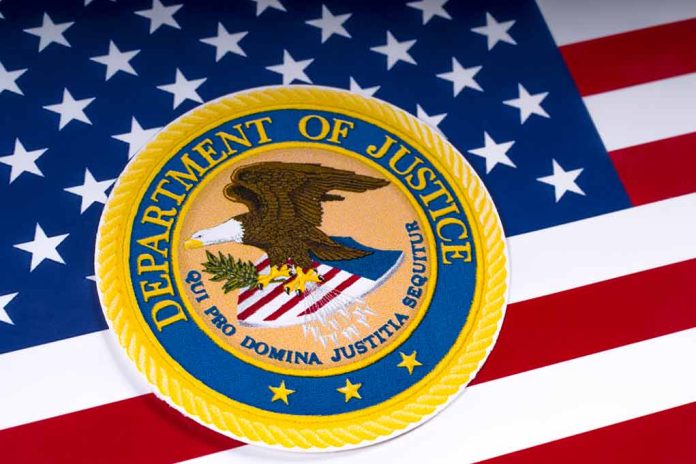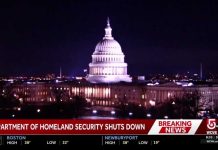
Trump’s Justice Department launches aggressive legal assault against four blue states’ climate laws that threaten American energy independence and national security.
Key Takeaways
- The DOJ filed unprecedented lawsuits against Hawaii, Michigan, New York, and Vermont over climate policies that allegedly violate federal authority and the Clean Air Act.
- Attorney General Pamela Bondi asserts these Democrat-led state actions jeopardize America’s energy security and economic stability by imposing unlawful restrictions on energy operations.
- New York and Vermont’s “climate superfund laws” demand billions from energy companies, with New York seeking $75 billion in damages for past greenhouse gas emissions.
- The lawsuits aim to prevent Hawaii and Michigan from filing planned litigation against fossil fuel companies for climate change damages.
- The legal action aligns with President Trump’s Executive Order 14260 to unleash American energy production by removing state-imposed barriers.
DOJ Takes Unprecedented Action Against Democrat-Led States
The Department of Justice has launched a major legal offensive against four Democrat-controlled states, filing lawsuits to block climate policies that the Trump administration considers harmful to national energy security. The unprecedented legal action targets Hawaii, Michigan, New York, and Vermont for implementing or planning measures that would hold fossil fuel companies financially accountable for climate change impacts. These lawsuits represent one of the most aggressive federal moves against state climate initiatives in U.S. history, reflecting President Trump’s commitment to American energy dominance.
“These burdensome and ideologically motivated laws and lawsuits threaten American energy independence and our country’s economic and national security,” Attorney General Pamela Bondi said in a statement announcing the legal actions.
At the heart of the dispute is the federal government’s contention that these state actions violate the Clean Air Act, which authorizes the Environmental Protection Agency to regulate air emissions while displacing state regulation of greenhouse gases. The DOJ’s lawsuits specifically target New York and Vermont’s enacted superfund laws as well as Hawaii and Michigan’s planned legal actions against energy companies, asserting these measures infringe upon federal jurisdiction and constitutional principles.
Billions at Stake as Blue States Target Energy Companies
The stakes in this legal battle are enormous, particularly in New York, where the state’s climate superfund law seeks to extract $75 billion from energy companies for past greenhouse gas emissions. Vermont has enacted a similar law demanding unspecified but potentially substantial payments. These laws impose strict liability on energy companies for their global fossil fuel activities, essentially creating a state-level tax on energy production that the DOJ argues is federally preempted and unconstitutional.
“The Department of Justice is working to ‘Unleash American Energy’ by stopping these illegitimate impediments to the production of affordable, reliable energy that Americans deserve,” Attorney General Pamela Bondi stated, emphasizing the administration’s commitment to energy security.
Meanwhile, Michigan Attorney General Dana Nessel has pushed back strongly against the federal action, calling it “at best frivolous and arguably sanctionable” while promising to proceed with her state’s planned lawsuit against energy companies. Hawaii officials have similarly indicated they plan to continue pursuing climate accountability measures despite federal pressure, setting up what promises to be a prolonged legal conflict between state and federal authorities.
Protecting Energy Security and Constitutional Authority
The Trump administration’s legal strategy centers on both constitutional principles and practical concerns about energy security. Acting Assistant Attorney General Adam Gustafson emphasized that state overreach in energy regulation directly impacts national energy production capabilities and aids America’s geopolitical adversaries. The DOJ is seeking federal court declarations that these state laws are unconstitutional, along with injunctions preventing their enforcement.
“When states seek to regulate energy beyond their constitutional or statutory authority, they harm the country’s ability to produce energy and they aid our adversaries,” Acting Assistant Attorney General Adam Gustafson said in the DOJ’s announcement.
The lawsuits directly respond to President Trump’s Executive Order 14260, which directs federal agencies to stop state laws that burden domestic energy development. Legal experts have described the DOJ’s approach as unusually aggressive, particularly the effort to preemptively block states from filing lawsuits. This proactive legal strategy signals the administration’s determination to protect American energy production from state-level climate regulations that could drive up costs and reduce energy availability.
Broader Implications for State Climate Policies
This legal confrontation represents more than just a battle over specific state laws; it highlights the fundamental tension between state climate initiatives and federal energy policy under the Trump administration. Critics argue the DOJ’s actions amount to an intimidation tactic designed to chill state-level climate action nationwide, while supporters view it as a necessary step to prevent a patchwork of contradictory state regulations that would hamstring America’s energy sector and economic recovery.
The outcome of these lawsuits could significantly reshape the landscape for state climate policies across the country. If successful, the federal action would establish clear limits on states’ ability to hold energy companies financially accountable for climate impacts. This would effectively centralize climate and energy policy at the federal level, aligning with President Trump’s vision of American energy dominance, unfettered by state-level environmental restrictions that his administration views as excessive and ideologically motivated.
As this legal battle unfolds, it represents a critical front in the broader effort to secure America’s energy future and maintain constitutional boundaries between state and federal authority. The Trump administration’s aggressive defense of energy producers against state climate initiatives demonstrates its commitment to affordable energy as a cornerstone of economic security and national strength.




